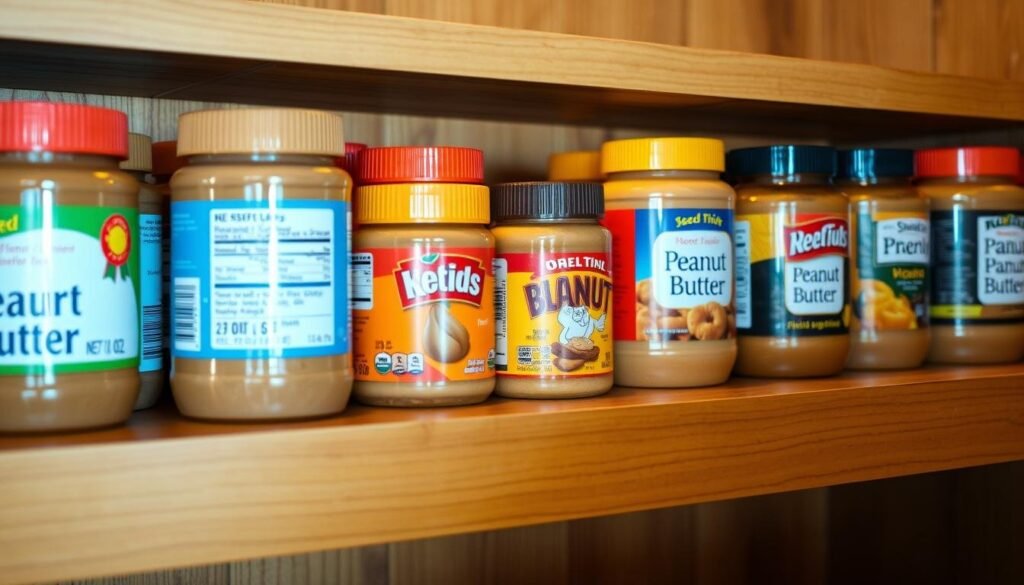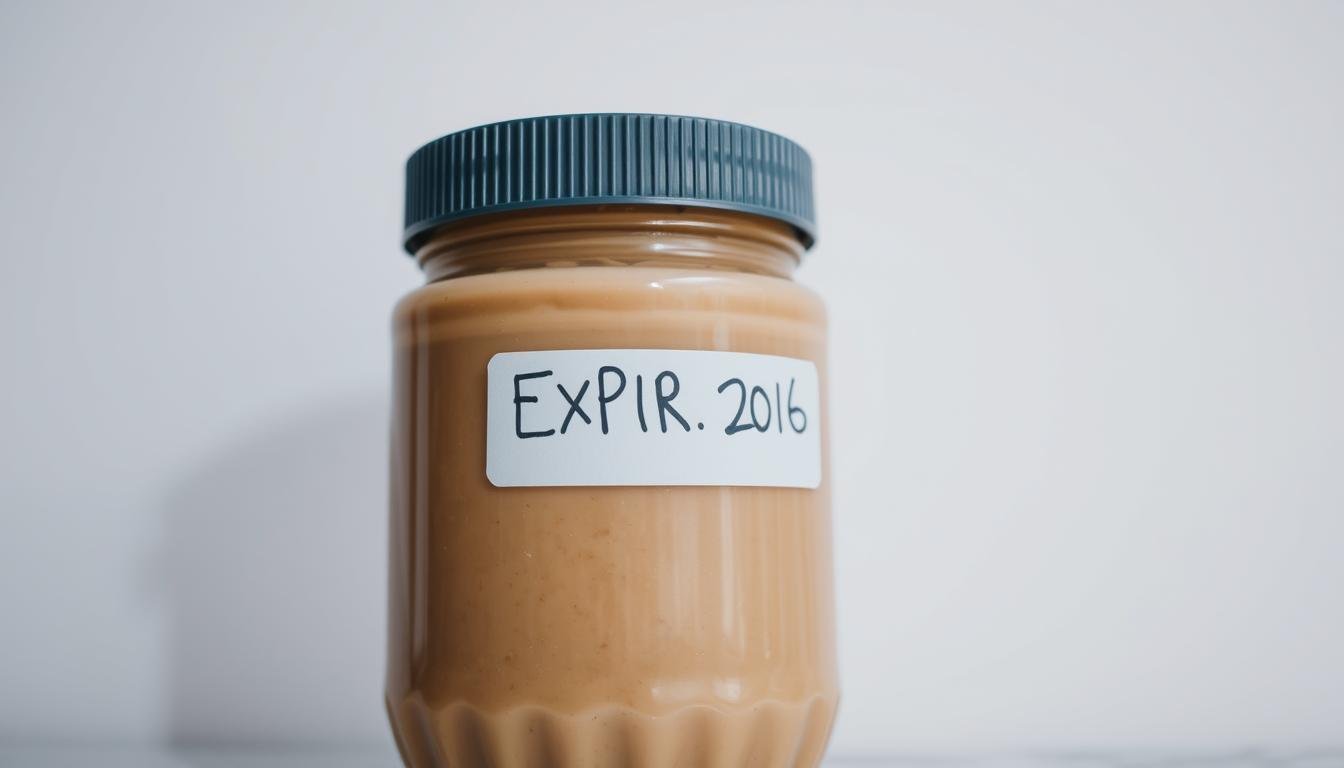Last updated on September 23rd, 2025 at 09:47 am
Ever thought about eating peanut butter after it’s past due? Knowing how long peanut butter lasts is key to keeping food safe and tasty.
Looking through your pantry, you might spot a jar of peanut butter that’s expired. But is it okay to eat it? It really depends on how it’s stored and if it shows any signs of going bad.
This article will help you figure out if expired peanut butter is safe to eat. You’ll learn how to check your peanut butter for spoilage and what happens if you eat it after it’s expired.
Contents
- 1 Understanding Peanut Butter Expiration Dates
- 2 Can You Eat Peanut Butter After Expiration Date?
- 3 Signs Your Peanut Butter Has Gone Bad
- 4 Proper Storage Methods to Extend Peanut Butter Shelf Life
- 5 Final Considerations for Peanut Butter Safety
- 6 FAQ
- 6.1 What does the expiration date on peanut butter mean?
- 6.2 Can I eat peanut butter after the expiration date?
- 6.3 How do I store peanut butter to extend its shelf life?
- 6.4 What are the signs that peanut butter has gone bad?
- 6.5 Is natural peanut butter more prone to spoilage than commercial peanut butter?
- 6.6 Can I still eat peanut butter that has been opened for a long time?
- 6.7 How does refrigeration affect peanut butter’s shelf life?
- 6.8 Can I store peanut butter at room temperature?
Understanding Peanut Butter Expiration Dates
Ever wondered about the dates on your peanut butter jar? Knowing these dates is key to figuring out how long your peanut butter lasts.
Best By vs. Use By vs. Sell By Dates
“Best By,” “Use By,” and “Sell By” are common on peanut butter jars. But they mean different things. “Best By” shows when the product is at its best quality. “Use By” tells you the last date to use it. “Sell By” helps stores manage their stock.
Here’s a quick guide to these dates:
| Date Type | Purpose | Guideline |
|---|---|---|
| Best By | Peak Quality | Manufacturer’s estimate |
| Use By | Last Date for Use | Consumer guideline |
| Sell By | Inventory Management | Store inventory |
FDA Guidelines on Food Dating
The FDA doesn’t require expiration dates on peanut butter. But, manufacturers often add them. The FDA makes sure food labels are accurate and safe.
Commercial Brands (Jif, Skippy, Peter Pan)
Brands like Jif, Skippy, and Peter Pan use different ingredients. This affects how long they last. Some may have additives to keep them fresh longer.
Natural and organic peanut butters have fewer preservatives. This means they might not last as long. Proper storage is crucial to keep them fresh.
To keep peanut butter fresh, store it in a cool, dry place. For natural peanut butter, refrigeration helps prevent oil separation.
Can You Eat Peanut Butter After Expiration Date?
Many people wonder if it’s safe to eat peanut butter after its expiration date. It’s important to know what affects peanut butter’s safety after it’s past its expiration date.
Low Moisture Content and Preservation
Peanut butter has very little moisture, which helps it stay fresh longer. This makes it hard for bacteria and mold to grow. Proper storage also helps keep it fresh.
Potential Contaminants Over Time
Even with low moisture, peanut butter can still get contaminated. Air, moisture, and other contaminants can affect its safety. Always look for signs of spoilage.
The type of container peanut butter comes in matters a lot. If it’s opened, it’s exposed to air and possible contaminants. This can shorten its shelf life.
Special Considerations for Natural Peanut Butter
Natural peanut butter, without added preservatives, needs extra care. It might not last as long as regular peanut butter and can spoil faster.
General Guidelines for Consumption
- Always check the expiration date before consuming.
- Inspect the peanut butter for signs of spoilage, such as an off smell or mold.
- Store peanut butter properly to maintain its quality.
When to Definitely Discard
If you see an off smell, mold, or a bad taste, throw it away. If you’re unsure, it’s better to be safe than sorry.
Signs Your Peanut Butter Has Gone Bad
Checking your peanut butter for spoilage signs is important. If you see any of these signs, it’s best to throw it away. This keeps you safe from health risks.
Mold Growth and Discoloration
Mold growth is a clear sign of spoilage. Visible mold or an off-color appearance means your peanut butter has gone bad. Look at the surface and sides of the jar for mold or discoloration.

Peanut butter naturally separates into oil and solids. But too much oil separation is a spoilage sign. If the oil layer is thick or the peanut butter feels uneven, it might be bad.
Rancidity and Off Odors
Rancid peanut butter smells strong and unpleasant. If it smells sour, bitter, or sharp, it’s bad. Trust your nose; if it smells off, throw it away.
Flavor Alterations
A change in flavor can mean spoilage. If your peanut butter tastes sour, bitter, or different from usual, it’s spoiled. It should taste rich and nutty.
Dryness and Hardening
Peanut butter can dry out and harden over time. But if it’s too hard or dry, it might be spoiled. Check if it’s hard to spread or has become rock-hard.
Unusual Consistency Changes
Unusual consistency changes are a bad sign. If it’s too runny, has an uneven texture, or feels gritty, it’s gone bad.
Regularly checking your peanut butter for these signs keeps it fresh and safe. Storing it in a cool, dry place or fridge can extend its shelf life. If unsure, it’s best to throw it away to avoid health issues.
- Check for mold growth and discoloration
- Monitor for excessive oil separation
- Be aware of rancidity and off odors
- Notice any flavor alterations
- Check for dryness and hardening
- Watch for unusual consistency changes
By watching for these signs, you can enjoy your peanut butter safely. This way, you get the most out of your peanut butter shelf life and store it well.
Proper Storage Methods to Extend Peanut Butter Shelf Life
Storing peanut butter right can make it last longer. Knowing the best ways to store it is key to keeping it fresh.
Oil Separation Management
Peanut butter can separate into oil and solids. Stir it well before storing to manage this. Natural peanut butter, in particular, separates more.
Preservative Differences
Some peanut butters have preservatives to last longer. Others are natural and don’t have additives. Knowing your peanut butter’s type helps choose the right storage.
Pantry Storage Guidelines
Most peanut butters do well in the pantry. Store the jar in a cool, dry spot, away from sunlight. Make sure the lid is tight to keep air out.
Refrigeration Benefits and Drawbacks
Refrigerating peanut butter can make it last longer by slowing down oxidation. But, it might harden and be hard to spread. If you refrigerate, use an airtight container.
Preventing Cross-Contamination
Always use a clean knife when scooping peanut butter. This keeps it safe and of good quality.
Airtight Storage Solutions
Keeping peanut butter in an airtight container is crucial. If you’ve opened a big jar, move some to a smaller container to reduce air exposure.
| Storage Method | Benefits | Drawbacks |
|---|---|---|
| Pantry Storage | Easy access, maintains spreadability | Shorter shelf life compared to refrigeration |
| Refrigeration | Extends shelf life, slows down oxidation | Hardens peanut butter, requires airtight container |
By following these tips, you can enjoy your peanut butter longer and keep it tasting great.
Final Considerations for Peanut Butter Safety
You now know when it’s safe to eat peanut butter after its expiration date. Keeping it stored right and spotting spoilage signs are key to safety.
To keep your peanut butter fresh, store it in a cool, dry spot. Always check for any signs of spoilage before you eat it. The expiration date is just a guide. The real shelf life depends on how you store it and handle it.
By paying attention to these details, you can safely enjoy peanut butter even after its expiration date. This is true as long as it’s been stored correctly and looks good. This way, you can enjoy peanut butter without worrying about safety.
FAQ
What does the expiration date on peanut butter mean?
The “Best By” or “Use By” date on peanut butter shows when it’s at its best quality. It doesn’t mean it’s unsafe to eat after that date.
Can I eat peanut butter after the expiration date?
Yes, you can eat peanut butter after its expiration date if it’s been stored right. It’s hard for bacteria and mold to grow in peanut butter because it’s low in moisture.
How do I store peanut butter to extend its shelf life?
Keep peanut butter in an airtight container in a cool, dry spot like a pantry. Refrigeration can also help prevent oil separation and spoilage.
What are the signs that peanut butter has gone bad?
Bad peanut butter shows mold, color changes, too much oil separation, rancidity, bad smells, taste changes, dryness, hardening, and odd textures.
Is natural peanut butter more prone to spoilage than commercial peanut butter?
Yes, natural peanut butter spoils faster than commercial because it lacks preservatives. It needs careful storage, like refrigeration, to last longer.
Can I still eat peanut butter that has been opened for a long time?
You can still eat peanut butter that’s been open for a while if it’s been stored right and looks good. But, always check for mold, rancidity, or other spoilage before eating.
How does refrigeration affect peanut butter’s shelf life?
Refrigeration slows down oxidation and stops mold and bacteria growth in peanut butter. But, it can make the peanut butter thicker and harder.
Can I store peanut butter at room temperature?
Yes, you can store peanut butter at room temperature. But, it’s best to use an airtight container to keep it fresh and prevent spoilage.

Hello, I am Bellamy George, a certified nutritionist and food safety specialist from Springfield, IL. With a degree in Food Science, I share research-backed insights on edible foods, seeds, and seafood for safe, informed eating.

